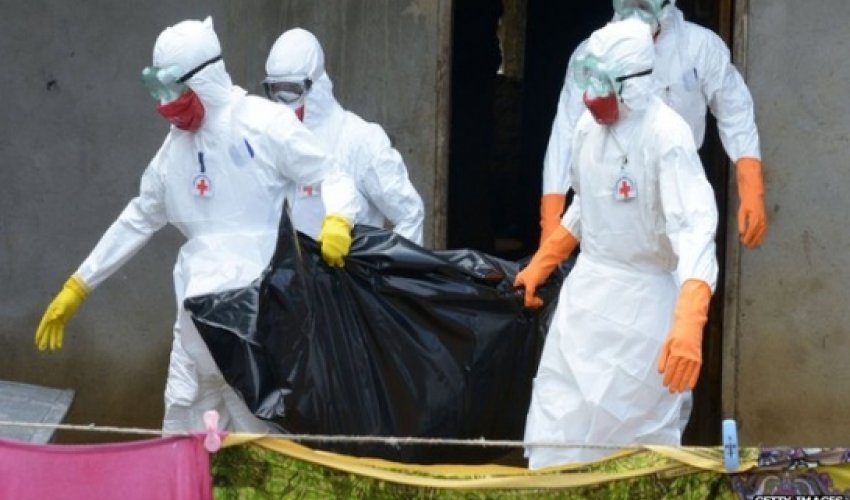Ebola: How bad can it get?

Healthcare workers are visibly struggling, the response to the outbreak has been damned as "lethally inadequate" and the situation is showing signs of getting considerably worse.The outbreak has been running all year, but the latest in a stream of worrying statistics shows 40% of all the deaths have been in just the past three weeks.So what can we expect in the months, and possibly years, to come?Taking offCrystal-ball gazing can be a dangerous affair, particularly as this is uncharted territory.Previous outbreaks have been rapidly contained, affecting just dozens of people; this one has already infected more than 3,900.But the first clues are in the current data.Dr Christopher Dye, the director of strategy in the office of the director general at the World Health Organization, has the difficult challenge of predicting what will happen next.He told the BBC: "We're quite worried, I have to say, about the latest data we've just gathered."Up until a couple of weeks ago, the outbreak was raging in Liberia especially close to the epicentre of the outbreak in Lofa County and in the capital Monrovia.However, the two other countries primarily hit by the outbreak, Sierra Leone and Guinea, had been relatively stable. Numbers of new cases were not falling, but they were not soaring either.That is no longer true, with a surge in cases everywhere except some parts of rural Sierra Leone in the districts of Kenema and Kailahun."In most other areas, cases and deaths appear to be rising. That came as a shock to me," said Dr Dye.Only going upThe stories of healthcare workers being stretched beyond breaking point are countless.A lack of basic protective gear such as gloves has been widely reported.The charity Medecins Sans Frontieres has an isolation facility with 160 beds in Monrovia. But it says the queues are growing and they need another 800 beds to deal with the number of people who are already sick.This is not a scenario for containing an epidemic, but fuelling one.Dr Dye's tentative forecasts are grim: "At the moment we're seeing about 500 new cases each week. Those numbers appear to be increasing."I've just projected about five weeks into the future and if current trends persist we would be seeing not hundreds of cases per week, but thousands of cases per week and that is terribly disturbing."The situation is bad and we have to prepare for it getting worse."The World Health Organization is using an educated guess of 20,000 cases before the end, in order to plan the scale of the response.But the true potential of the outbreak is unknown and the WHO figure has been described to me as optimistic by some scientists.International spread?The outbreak started in Gueckedou in Guinea, on the border with Liberia and Sierra Leone.But it has spread significantly with the WHO reporting that "for the first time since the outbreak began" that the majority of cases in the past week were outside of that epicentre with the capital cities becoming major centres of Ebola.Additionally one person took the infection to Nigeria, where it has since spread in a small cluster and there has been an isolated case in Senegal.Prof Simon Hay, from the University of Oxford, will publish his scientific analysis of the changing face of Ebola outbreaks in the next week.He warns that as the total number of cases increases, so does the risk of international spread.He told me: "I think you're going to have more and more of these individual cases seeding into new areas, continued flows into Senegal, Cote d'Ivoire, and all the countries in between, so I'm not very optimistic at the moment that we're containing this epidemic."There is always the risk that one of these cases could arrive in Europe or North America.However, richer countries have the facilities to prevent an isolated case becoming an uncontrolled outbreak.The worry is that other African countries with poor resources would not cope and find themselves in a similar situation to Guinea, Liberia and Sierra Leone."Nigeria is the one I look at with great concern. If things started to get out of control in Nigeria I really think that, because of its connectedness and size, that could be quite alarming," said Prof Hay.End game?It is also unclear when this outbreak will be over.Officially the World Health Organization is saying the outbreak can be contained in six to nine months. But that is based on getting the resources to tackle the outbreak, which are currently stretched too thinly to contain Ebola as it stands.There have been nearly 4,000 cases so far, cases are increasing exponentially and there is a potentially vulnerable population in Sierra Leone, Liberia and Guinea in excess of 20 million.(BBC)Bakudaily.Az




































 Photo
Photo 



 Video
Video 

